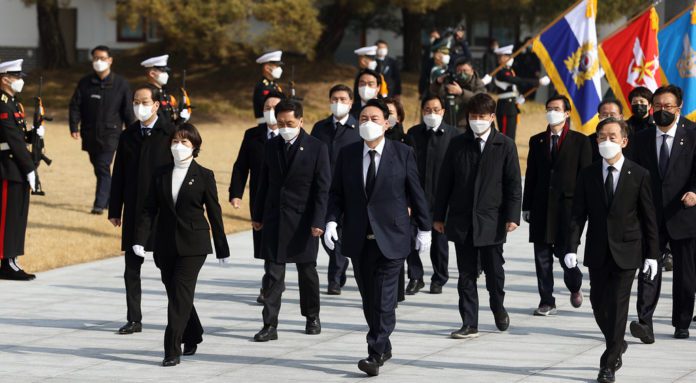Yoon Suk-yeol’s presidential transition committee announced 110 national tasks on Tuesday, reversing some of the Moon Jae-in government’s North Korea, nuclear, real estate, and prosecution policies.
Regarding foreign policy and national security issues, Yoon’s transition team said it will focus on the complete, verifiable and irreversible denuclearization of North Korea, normalization of inter-Korean relations, providing humanitarian aid, and strengthening the alliance with the United States. In the defense sector, the team suggested reinforcement of capabilities against North Korea’s nuclear and missile threats and the conditional transition of wartime operational control.
According to the transition team, Yoon said his government will work on realizing sustainable peace on the Korean Peninsula through North Korea’s complete and verifiable denuclearization and pursue denuclearization and a peace regime based on these principles.
To that end, Yoon’s plan is to present a predictable denuclearization roadmap through close coordination with the United States and push for denuclearization negotiations with North Korea based on the principle of reciprocity. It also said it will deal with the North Korean human rights issue, which the Moon Jae-in government ignored, by launching the North Korean Human Rights Foundation and other measures. The transition team said that it will expand areas of cooperation with the United States into a comprehensive strategic alliance while realizing relations based on mutual respect and cooperation with China.
In the field of defense, Yoon’s transition team has set out a goal of real deterrence capabilities by dramatically enhancing the South Korean military’s response capabilities. It also plans to amend the wage program for military servicemen and expand that system to both public institutions and the private sector based on its effects and results. The transition team said it will institute a salary of 2 million won ($1,577) per month for enlisted soldiers by 2025 in the form of a combination of soldiers’ salaries and asset formation programs.
The 110 national tasks of the Yoon’s administration are focused on the theme of the government accompanying the people, in which job creation and economic growth are left to the private sector and the government supports them through regulatory reform and tax support. It plans on converting the Moon Jae-in administration’s so-called “income-led growth” policy to “private-led growth” to create good and sustainable jobs with a virtuous cycle of growth, welfare and jobs.
The transition team selected a “dynamic economy led by the private sector and supported by the government” as its key goal. The nation’s corporate support system will be completely reorganized to focus on private companies. The government will establish a so-called “Industrial Innovation Strategy Conference” chaired by the president and jointly come up with plans to grow economically with the private sector.
Yoon Suk-yeol’s government also said it will scrap Moon’s nuclear energy phase-out policy and work to strengthen the nuclear industry. Accordingly, the construction of Shin Hanul units 3 and 4 will be resumed promptly. In addition, by changing the application deadline for continuous operation from 2 to 5 years before the end of life to 5 to 10 years, the period of downtime will be systematically minimized.
The government will also aim to construct 10 nuclear power plants overseas by 2030 by creating a state support group to promote nuclear exports.
Yoon’s national tasks included a policy to correct the real estate market, which saw significant price hikes under the current administration. The incoming government will establish a roadmap to supply 2.5 million houses and relax real estate taxes.
To relieve the burden of real estate taxes, the administration will develop measures to reform the comprehensive real estate holding tax, review the capital gains tax policy for multiple homeowners and reorganize the acquisitions tax to ease the heavy tax burden.
The team said the national tasks would work toward realizing six national goals: Restoring “common sense,” creating a dynamic economy led by the private sector, creating a happy society for all, ensuring a bold future made with freedom and creativity, turning Korea into a global country contributing to freedom, ensuring peace and prosperity, and fostering an era of provinces where people can live well anywhere.
The transition team said, “The national goal has added the ‘future’ and the ‘provinces’ to the basic areas of politics, administration, economy, society, diplomacy and security.”


